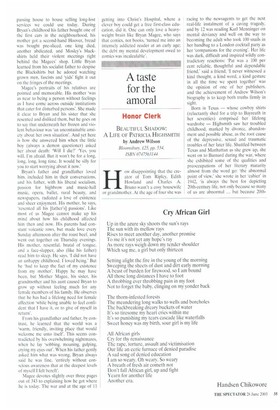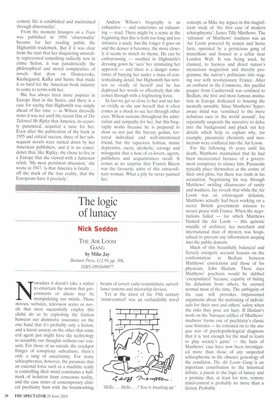A taste for the amoral
Honor Clerk
BEAUTIFUL SHADOW: A LIFE OF PATRICIA HIGHSMITH by Andrew Wilson Bloomsbury, 125, pp. 534, ISBN 0747563144 How disappointing that the creator of Tom Ripley, Edith Howland and Charles A. Bruno wasn't a cosy housewife or grandmother. At the age of four she was
racing to the newsagents to get the next real-life instalment of a caving tragedy, and by 12 was reading Karl Menninger on mental deviancy and well on the way to becoming the adult who took 100 snails in her handbag to a London cocktail party as her 'companions for the evening'. Her life was dark, difficult and inspired wildly contradictory reactions: Tat was a 100 per cent reliable, thoughtful and dependable friend,' said a friend; `I never witnessed a kind thought, a kind word, a kind gesture in all the time we spent together' was the opinion of one of her publishers, and the achievement of Andrew Wilson's biography is to keep both truths firmly in sight. Born in Texas — whose cowboy shirts (reluctantly shed for a trip to Bayreuth in her seventies) comprised her lifelong wardrobe — Highsmith saw her troubled childhood, marked by divorce, abandonment and possible abuse, as the root cause of the depressive, sexual and traumatic troubles of her later life. Shuttled between Texas and Manhattan as she grew up, she went on to Barnard during the war, where she exhibited some of the qualities and preoccupations of her literary maturity almost from the word go: 'the abnormal point of view.' she wrote in her 'cahier' in 1942, 'is always the best for depicting 20th-century life, not only because so many of us are abnormal ... but because 20th century life is established and maintained through abnormality'.
From the moment Strangers on a Train was published in 1950 'abnormality' became for her reading public the Highsmith trademark. But if it was clear from the start that her disquieting amorality represented something radically new in crime fiction, it was paradoxically the philosophical and moral complexities of novels that drew on Dostoyevsky, Kierkegaard, Kafka and Sartre that made it so hard for the American book industry to come to terms with her.
She has always been more popular in Europe than in the States, and there is a case for saying that Highsmith was simply ahead of her time — as Wilson shrewdly notes it was not until the recent film of The Talented Mr Ripley that America, its security punctured, acquired a taste for her. Even after the publication of the book in 1955 and critical success, three of her subsequent novels were turned down by her American publishers, and it is no coincidence that, like Ripley, she chose to live in a Europe that she viewed with a Jamesian relish. 'My most persistent obsession,' she wrote in 1947, 'is that America is fatally ... off the mark of the true reality, that the Europeans have it precisely.' Andrew Wilson's biography is an exhaustive — and sometimes an exhausting — read. There might be a sense at the beginning that this is both too long and too intrusive a study, but the longer it goes on and the denser it becomes, the more closely it seems to match its theme. He can be embarrassing — swathed in Highsmith's dressing gown he 'sees' her intimating her approval — and there is a danger sometimes of burying her under a mass of contextualising detail, but Highsmith has written so vividly of herself and he has deployed her words so effectively that she comes through with a frightening force.
In fact we get so close to her and see her so vividly as she saw herself that it often comes as a shock to see her through other eyes. Wilson sustains throughout his admiration and sympathy for her, but this biography works because he is prepared to show us not just the literary genius, tortured individual and well-intentioned friend, but the rapacious lesbian, manic depressive, racist, alcoholic, scrooge and misogynist that a host of ex-lovers, agents, publishers and acquaintances recall. It comes as no surprise that Francis Bacon was the favourite artist of this extraordinary woman. What a pity he never painted her.



































































 Previous page
Previous page